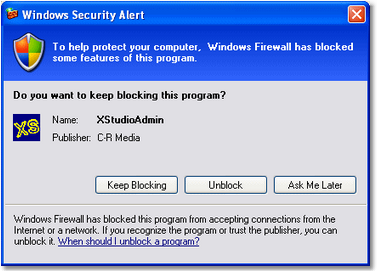In order for XStudio to communicate with a remote database server, certain TCP/IP ports must be available for use and not blocked by a firewall. This applies to both the XStudio PC and the PC running the database server application. If you launch XStudio and see a Windows message similar to the following, you either need to tell Windows to unblock the port or manually unblock the port.

Database Communication Ports
Only one TCP port is used for database communications and is the only required port. The default port number is: 16000.
If you are accessing a remote database server somewhere outside of your local area network (LAN), this is the only port that needs to be available and unblocked. Ports referred to in the section on broadcast ports are only useful on a local area network.
Broadcast Ports
The automatic retrieval of remote database server names is dependent on being able to broadcast a request for available servers to respond, and being able to receive their responses.
Broadcasts use as a default UDP ports 16000 (for requests) and 16001 (for responses). If you want to be able to retrieve a list of available remote database servers automatically, both of these ports need to be available and unblocked.
Default Port Usage Table
Use this table as a reference if manually configuring port blocking exceptions.
Port Type |
Port Number |
Usage |
|---|---|---|
TCP |
16000 |
Database communications. This is the only required port. |
UDP |
16000 |
Used to broadcast requests for available database servers. Useful only on the local area network. |
UDP |
16001 |
Used to receive broadcast replies from available database servers. Useful only on the local area network. |